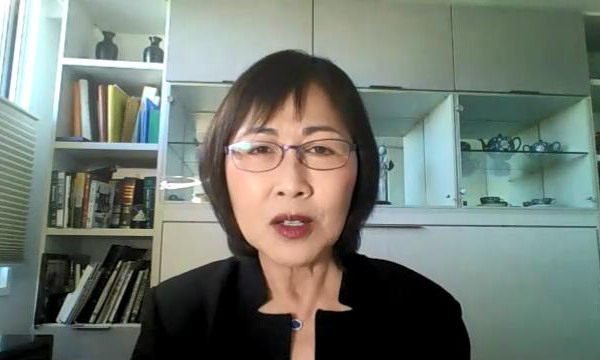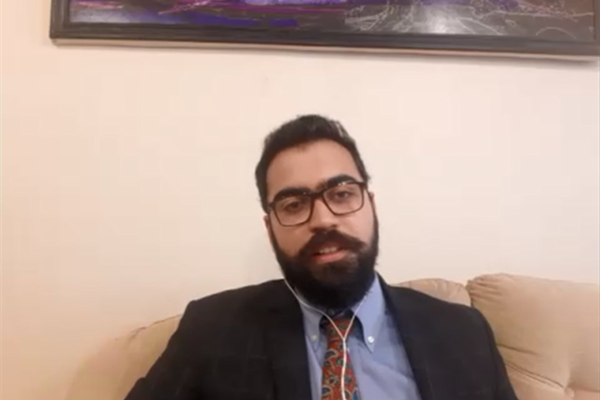•"America is having a civil war right now" and "targets are the Asians".
-- Julie Tang, former judge in California
•There should have been stronger cooperation and shared responsibilities among leading countries during this pandemic, but "that did not happen".
-- Zaeem Hassan Mehmood, expert in international relations and political science
54 years ago in 1967, Julie Tang moved to the United States. With talent, effort, and skill, she became the first Asian judge elected into office in San Francisco. However, since the first "Chinese virus" shouted by the U.S. former government, everything has changed.
After having lived in the U.S. for 54 years and served the country as a judge for 30 years, Tang finds out that she is still not able to feel safe in her own country as a Chinese American.
"Now when I go out, I wear a whistle so that if something happens to me, I will blow the whistle and maybe call attention of other people to help me," Tang told GDToday & Newsgd.com in a previous interview in March this year.

Biden's intelligence report will worsen the discrimination against Asians
Julie Tang was a judge for the Superior Court of San Francisco in California and one of the organizers of the "Stop Asian Hate" demonstration in San Francisco on March 27.
As of June 30, 9,081 anti-AAPI (Asian Americans and Pacific Islanders) hate incidents has been reported according to Stop AAPI Hate, and there are still more remaining uncovered.
The spur to these incidents is believed to be former U.S. President Donald Trump's "Chinese virus" allegation and his inflammatory remarks defaming China.
"We really hoped that when the new President Biden was elected", things would change, Tang told the reporter in March. Obviously, things have barely changed.
In May, Biden ordered intelligence agencies to investigate the COVID-19 origins with 2 presumptions including a "lab leak" in Wuhan. In the meantime, the U.S. keeps clamping down on WHO and pressing China for more information, while rejecting any investigation in its own land. After an inconclusive report was finally churned out, the U.S. then blames its failure on China's lack of transparency.
"He was elected with the majority of Asian votes. He continues the old President's policy and continues to drive us into war," said Tang with disappointment. "America is having a civil war right now" and "targets are the Asians."
Right after the release of U.S. intelligence report on COVID-19 origins, the Chinese Embassy in the U.S. alerted its citizens, on August 28, to the increasing risks of hate crime that may be incurred by the report.
This year, 4,533 Anti-AAPI hate incidents have been reported before July. People are being killed and harassed because of discrimination, to which the U.S. policy makers have made a significant contribution, Tang believed.
Politicization of COVID-19 origin tracing is accelerating a "New Cold War"
Besides driving the U.S. into a new civil war as Tang said, Biden administration's politicization of COVID-19 origin tracing and antagonizing China are also accelerating the trend of a "New Cold War" across the world, according to Zaeem Hassan Mehmood, Manager Political Risk and Analysis for a research organization in Pakistan and a PhD scholar of International Relations and Political Science at Greenwich University.

In a statement by Biden on August 27 local time, he accused China of thwarting international investigation and shirking responsibilities, while in Hassan's opinion, it is the U.S that is attempting to "point all the responsibilities towards China" all along through political manipulation as seen in the involvement of intelligence agencies in the origin investigation. "You need to create an enemy to shift all the blame on," Hassan added.
As of 02:21 PM, September 2, the total number of COVID-19 cases in the U.S. has reached more than 39 million with 642,081 people having died from infection. The country is now facing a surge in new cases due to the more contagious delta variant.
Though the Americans are suffering from the spread of the virus, the Biden administration seems to be more obsessed with spreading political virus by making COVID-19 origin tracing a political issue, said Chinese Vice Foreign Minister Ma Zhaoxu on August 28.
In order to further exert political pressure on China, the U.S. has been rallying allies, pressing international organizations such as WHO, and sowing discord between China and its neighbouring countries.
"That seems to be a repetition of the Cold War between the Soviet Union and the U.S.," Hassan commented on the U.S. recent moves. "People thought that maybe this pandemic would bring a big deal of cooperation, and there would be lots of responsibilities shared by the leading countries. However, that did not happen."
Despite the ongoing dissonance between China and the U.S., Hassan still hopes that issues like Afghan reconstruction and a global economic recession will open up opportunities for future cooperation between the two countries, and thus bring the world back to the track of peace and development.
According to Julie Tang, during the 40 years after 1979, when the US and China normalized their relationship, Chinese Americans have been living the good life in the US.
"When things are good between China and the US, we get good. When things are bad, we get bad."
Reporter| Lydia Liu, Hannah Zhou
Editor| Wing, Keane, Jerry Grey




